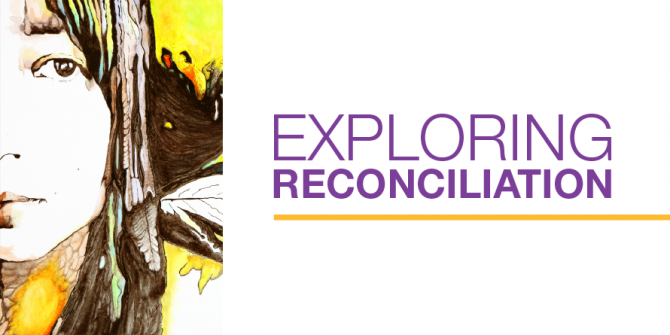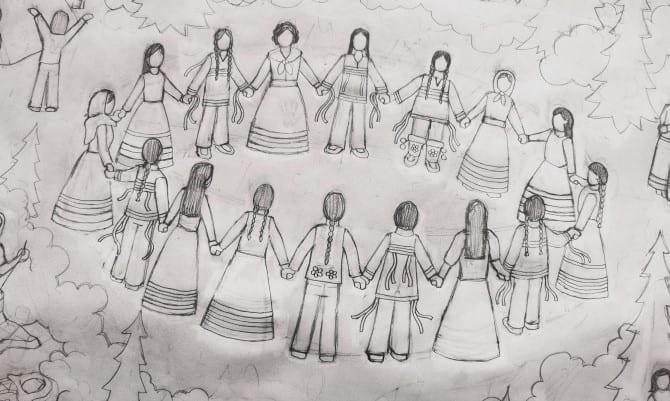This blog post was co-authored by members of EPL’s Indigenous Services Team (IST), which provides leadership in the development and delivery of Indigenous classes, events, services and staff training. Andrew, Manager of the Londonderry Branch, is the IST Chair and Emily is EPL’s Senior Advisor, Indigenous Relations. She is Nehiyaw from the Alexander First Nation here in Treaty 6 Territory.
Collaborating with Indigenous communities is foundational to our work at EPL. We strive to ensure our library branches are welcoming to all and our services, classes and events are of interest to Indigenous and non-Indigenous peoples.
Amiskwaciwâskahikan (Edmonton) has been a place of gathering and trade for thousands of years. Public libraries are an extension of this tradition in that they are places for public dialogue and learning. If we are to live well together, in a Treaty relationship, it is important we continue to gather so we can learn from one another and understand how settler and Indigenous histories intersect. Collaboration is essential in order to provide Edmontonians opportunities to learn about Indigenous history and culture. At the Library, adults and children alike can attend classes and events, borrow material by Indigenous authors, get staff recommendations, learn from online resources and seek guidance from our Elder-in-Residence Nôhkom Jo-Ann Saddleback.
Looking Back: A Focus on Reconciliation
In 2016, EPL introduced the Exploring Reconciliation series in response to the work of the Truth and Reconciliation Commission of Canada (the TRC) and its Calls to Action. Its purpose was to help Edmontonians deepen their understanding of reconciliation and how it impacts Canadians. Customers were invited to join EPL for thoughtful discussion and reflection through speaker presentations from Indigenous and non-Indigenous Canadians, blanket exercises, documentary film screenings, storytelling events, book clubs and family storytimes.

Today, we are acutely aware—and reminded of by the confirmation of unmarked graves of stolen Indigenous children at residential school sites across the country—that the work to first confront the truth, then work towards reconciliation, is far from over. Recognizing the importance of learning and making amends, EPL continues our commitment to the TRC’s Calls to Action by sharing knowledge, information and opportunities for dialogue between diverse voices and perspectives as it relates to reconciliation.
As a public institution, it is imperative we integrate the spirit and intent of these Calls to Action into our work. As Elder-in-Residence Nôhkom Jo-Ann Saddleback has shared with EPL, “culture is not a product, but a process”. There is much we must experience, talk about and act upon if we are to address systemic racism in Canada. Understanding Indigenous worldviews is integral when this is exactly what residential schools attempted to exterminate. In the years since the release of the TRC Report, we have seen the conversation evolve to include cultural teaching, reclamation of identity, language, names and spaces, and celebration of diverse peoples, voices and experiences.
To further our commitment to truth and reconciliation, while capturing the full breadth of meaning, action, and kinship at the heart of the process, we are thrilled to introduce Mâmawô ayâwin, a new program launching this summer that reflects the true nature of this work.
Looking Ahead: An Invitation to Gather
At some points in history, it was illegal for First Nations people to gather in groups of three or greater. This was an effort by the Canadian government to suppress First Nations gathering and ceremony. Gathering is an important part of the resurgence of Indigenous cultures.
Libraries have long been community gathering places for people and ideas. EPL offers open, inviting and comfortable spaces that provide refuge, comfort and community for all Edmontonians. At the Library, customers can pursue solo endeavours, whether reading, study or work, or connect with others, whether family, friends, colleagues or the community at large.
EPL also serves as connector, actively bringing diverse groups together, whether in person or online. We promote dialogue, increasing understanding and inspiring change.
It is in this spirit that we developed Mâmawô ayâwin.
The Name
Mâmawô ayâwin means “all being together” in Nehiyawewin (Plains Cree). The name is a reflection of EPL’s intention to bring Indigenous and non-Indigenous Peoples together to learn, discuss and celebrate under various topics.
Following in the footsteps of PÎYÊSÎW WÂSKÂHIKAN, EPL’s Indigenous gathering space at the new Stanley A. Milner Library, Mâmawô ayâwin also uses the Indigenous language to bring visibility to Indigenous languages within EPL.
The Approach
As mentioned above, seeking guidance from and collaborating with Indigenous communities is central to EPL’s approach in the design and delivery of Indigenous Services. Mâmawô ayâwin is consistent with this approach, where community partners will play an active role in the creation and delivery of each class and event.
Recognizing the powerful role of imagery in storytelling, EPL also felt it was crucial that customers see the Indigenous community reflected in the visuals associated with the Mâmawô ayâwin series. That’s why we commissioned local artist Lance Cardinal of Bigstone Cree Nation, Treaty 8 territory, to create the image that will be used across all Mâmawô ayâwin promotional materials.
We cannot wait to reveal his stunning artwork very soon. In the meantime, please enjoy this preview. For sneak peeks, be sure to follow EPL on our social media channels (Instagram, Facebook and Twitter).
For more information about Indigenous services and programming at EPL, be sure to visit epl.ca/indigenous. Watch for more details about Mâmawô ayâwin and an invitation to gather with us—coming later this month!



Add a comment to: Introducing Mâmawô ayâwin